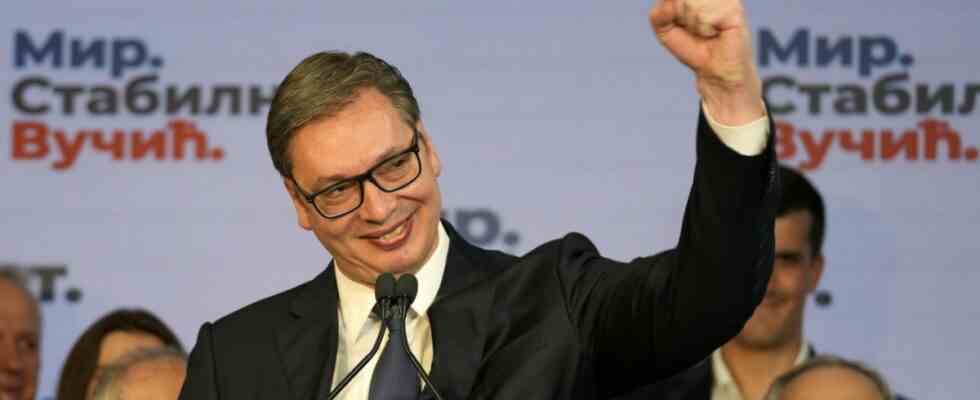How does he see his own position in this state structure? Aleksandar Vučić provided a nice illustration of this on Sunday evening. The state election commission had announced that it would only announce the first official results of the presidential and parliamentary elections on Monday. This was no reason for the incumbent to wait: he just announced his election victory himself.
So, citing projections made by his own party, he announced that it had garnered enough votes to form a government with the Hungarian minority party. And he himself achieved 59.9 percent in the presidential election – a result just below the 60 percent threshold, which he had described in advance as the limit to failure. And so, by his standards, he appeared quite statesmanlike and thoughtful: The “crisis in Ukraine” had moved Serbia “dramatically to the right,” he said, referring to a few smaller parties that managed to get into parliament. However, his own “Serbian Progressive Party” (SNS) will resist this trend. The electoral commission then declared him the winner on Monday, albeit by a good one percentage point less.
The opponents only appeared in the media as problem bringers
Vučić, the rock in the midst of world events that are being whipped up; the defender of the middle-class against extremist tendencies? The fact that he can get away with this self-portrayal says a lot about the state of Serbian democracy. Vučić’s alleged electoral success is also based on the fact that the opposition was not able to make itself heard: Vučić was omnipresent with his benevolent messages both on state television and in the numerous private media close to the government; the challengers appeared, if at all, as problem bringers. And the resentment that was stirring among the people, for example about the environmental destruction caused by the government-driven lithium mining, was then largely contained by the uncertainty that the Ukraine war triggered. The motto “Freedom. Stability. Vučić.” acted like a thick cotton swab that smothered all loud controversy.
The Europeans can now expect the traditional Serbian seesaw policy to continue: between the western counterparts in Washington and Brussels on the one hand and the eastern ones in Moscow and Beijing on the other. There are reasons to believe that Belgrade could distance itself somewhat more from Moscow in the future for economic reasons. But this does not make Vučić an advocate of Western values who would lead his country into the arms of the European Union out of conviction.
Europeans shouldn’t complain too loudly about this. They watched for a long time the dismantling of democratic standards, which according to the organization “Freedom House” has turned Serbia into a only “partially free” state; the story of Vučić as the supposed guarantor of stability in the notoriously unstable Balkans was all too comfortable from the point of view of Berlin and Brussels. In order to have any serious chance of joining the EU, the country would have to remedy the weaknesses in democracy and the rule of law. But for Vučić himself, for staying in power, these are far too useful.

